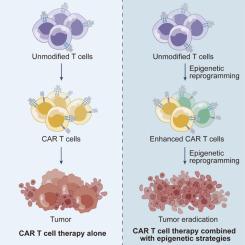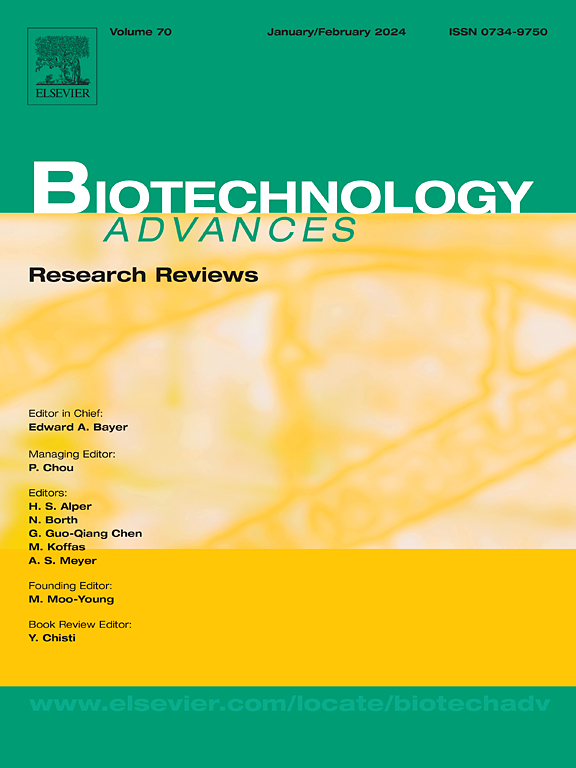Epigenetic reprogramming holds promise in enhancing anti-tumor efficacy of CAR T cell therapy
IF 12.5
1区 工程技术
Q1 BIOTECHNOLOGY & APPLIED MICROBIOLOGY
引用次数: 0
Abstract
Chimeric antigen receptor (CAR) T cell therapy has emerged as a pivotal treatment modality for advanced hematological malignancies. However, clinical evidence suggests that CAR T cell therapy has a low response rate, poor efficacy for solid tumor, and a high complication rate. Recent research highlighted the crucial role of epigenetics in tumor immunity, particularly in modulating the fate and function of T cells. The epigenetic landscapes among T cell subpopulations show substantial differences, which in turn have a profound impact on the effector function and persistence of T cells. Epigenetic reprogramming holds promise for enhancing the persistence of CAR T cells, augmenting T cell infiltration, and ameliorating the immunosuppressive microenvironment while impeding immune evasion. In addition, biomarkers derived from the epigenetics serve as indicators to predict patient prognosis. In recent years, a growing number of clinical trials have been initiated to explore the combination of epigenetic drugs with CAR T cell therapy, highlighting the therapeutic promise of this synergistic approach in improving efficacy and overcome therapeutic resistance. However, the non-specificity of epigenetic drugs, side effects of epigenetic gene editing, poor efficacy in solid tumors, and instability of epigenetic biomarkers for predicting prognosis remain areas for further exploration. In this review, we explored the characterization of epigenetic modification landscapes across CAR T cell subpopulations, discussed how epigenetic reprogramming addresses challenges associated with CAR T cell therapy, and provided insights into the limitations of combining epigenetic strategies with CAR T cell therapy.

表观遗传重编程有望提高CAR - T细胞治疗的抗肿瘤效果
嵌合抗原受体(CAR) T细胞疗法已成为晚期血液系统恶性肿瘤的关键治疗方式。然而,临床证据表明,CAR - T细胞疗法对实体瘤的反应率低,疗效差,并发症发生率高。最近的研究强调了表观遗传学在肿瘤免疫中的关键作用,特别是在调节T细胞的命运和功能方面。T细胞亚群之间的表观遗传景观显示出实质性的差异,这反过来又对T细胞的效应功能和持久性产生深远的影响。表观遗传重编程有望增强CAR - T细胞的持久性,增加T细胞浸润,改善免疫抑制微环境,同时阻碍免疫逃避。此外,来自表观遗传学的生物标志物可作为预测患者预后的指标。近年来,越来越多的临床试验开始探索表观遗传药物与CAR - T细胞治疗的结合,突出了这种协同方法在提高疗效和克服治疗耐药性方面的治疗前景。然而,表观遗传药物的非特异性、表观遗传基因编辑的副作用、在实体肿瘤中的疗效不佳以及预测预后的表观遗传生物标志物的不稳定性仍是有待进一步探索的领域。在这篇综述中,我们探讨了CAR - T细胞亚群中表观遗传修饰景观的特征,讨论了表观遗传重编程如何与CAR - T细胞治疗相关,并提供了将表观遗传策略与CAR - T细胞治疗相结合的局限性的见解。
本文章由计算机程序翻译,如有差异,请以英文原文为准。
求助全文
约1分钟内获得全文
求助全文
来源期刊

Biotechnology advances
工程技术-生物工程与应用微生物
CiteScore
25.50
自引率
2.50%
发文量
167
审稿时长
37 days
期刊介绍:
Biotechnology Advances is a comprehensive review journal that covers all aspects of the multidisciplinary field of biotechnology. The journal focuses on biotechnology principles and their applications in various industries, agriculture, medicine, environmental concerns, and regulatory issues. It publishes authoritative articles that highlight current developments and future trends in the field of biotechnology. The journal invites submissions of manuscripts that are relevant and appropriate. It targets a wide audience, including scientists, engineers, students, instructors, researchers, practitioners, managers, governments, and other stakeholders in the field. Additionally, special issues are published based on selected presentations from recent relevant conferences in collaboration with the organizations hosting those conferences.
 求助内容:
求助内容: 应助结果提醒方式:
应助结果提醒方式:


